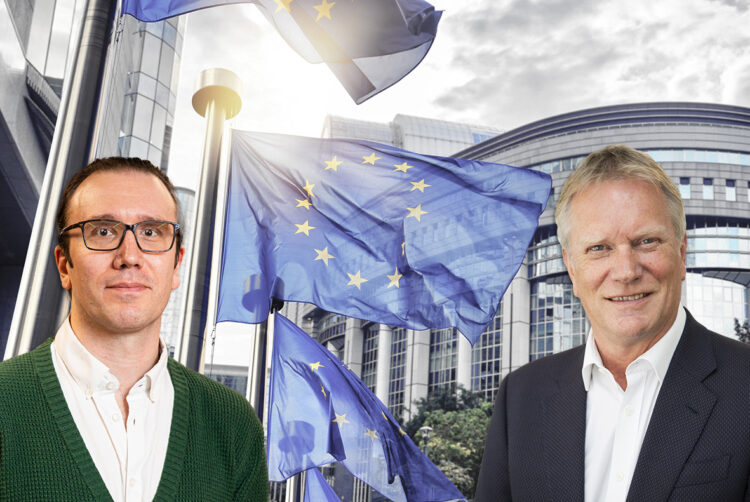Total Media: Brexit made us consider our international credibility

The Media Leader Interview
Total Media Group’s CEO and chairman discuss how Brexit accelerated the need to join forces with a European agency and why internationally ambitious indies require scale to succeed.
“What we needed was a European network and scale. What they needed was a London base they could project from.”
Last week, after seven years of partnership with Munich-based independent network Mediaplus, Total Media Group was formally acquired by the company.
In a conversation with The Media Leader, Total Media Group’s chairman, Guy Sellers, and CEO, Tom Laranjo, unpacked the agency’s special relationship with Mediaplus, revealing how important Brexit was to propelling Total Media Group into action for a long-considered continental expansion.
“We suddenly thought about our credibility,” Sellers reflects on the immediate period after the 2016 Brexit referendum. “Why would you appoint a London media agency to your European media when they’re not even in Europe?”
Sellers admits that if it hadn’t been for Brexit, the acquisition “certainly wouldn’t have happened the same way at all — it might have taken longer”.
No ‘distressed purchase’
Even with Brexit, a seven-year partnership leading into the eventual acquisition is a long time. Indeed, Laranjo says the Mediaplus deal was not done as a “shotgun wedding”. Rather, it occurred because of existing symmetries between the groups, with both “in a good place” financially and a drive to invest in differentiated media agency products.
“This isn’t some sort of distressed purchase because we’re in trouble, or because they need to fill a hole because they’ve lost lots of billings,” Laranjo continues. “It’s taken seven years to get to this point of marriage. We slowly got to know each other and, in that process, recognised that we’re both genuinely ambitious. We both really value independence and what that can allow.”
He adds: “The possibility to be part of a company that has the scale of Mediaplus, but [is] still independent… I really can’t think of any other brands like that.”
How indies can compete
A number of high-profile independents have been swallowed up in recent years. Jellyfish was bought by The Brandtech Group in 2023 and Goodstuff Communications was sold to fellow challenger agency group Stagwell in 2022. Brainlabs, meanwhile, has acquired a number of smaller indies as it seeks to build out its own global model.
However, Laranjo insists indies can still compete without merging with larger groups.
“There are some wicked independents in the UK and other markets who thrive on finding opportunity in niches, opportunities to do things differently, helping drive in-housing or by focusing on one particular audience or channel segment,” he says. “I wouldn’t want to say, now that we’re part of a bigger group: ‘That’s it, unless you’re part of a bigger group you can’t grow.'”
Still, for indies that are, like Total Media, “ambitious internationally”, Laranjo says “it becomes impossible” to go after regional or global briefs without being part of a bigger network.
The challenge speaks to why Sellers originally sought a post-Brexit European partner. For indies, international expansion necessitates considering M&A — if not as a buyer, then as a seller. And in an increasingly globalised and digitised media environment, international expansion is too big an opportunity to pass.
“I think that the scale of opportunity in international got bigger for independents if they’re able to technically execute,” Laranjo outlines. “Digital has helped accelerate that widely.”
Immediate priorities
Laranjo believes Total Media offers a significant point of difference from other agencies by not just talking a big game on studying consumer behaviour in response to advertising, but in making it a core part of its client proposition. He wants to speak straight with clients about how most consumers interact with media.
“If you understand [behavioural science], then you’d realise that the vast majority of us don’t notice ads. The vast majority of us don’t click on any ad and have never clicked on an ad. The vast majority of us don’t share an ad. The vast majority of us don’t talk about any advertising. The vast majority of us try and skip advertising. The place we focus most on on YouTube is the skip button and how long you have to wait to finally [click it].
“That’s how most people are. And if that’s the context in which you’re talking and communicating, how do you genuinely use these channels and formats to influence behaviour? Then the conversation gets a lot more interesting a lot more quickly.”
‘The tipping point in behavioural change has really happened now’
As the new CEO, Laranjo hopes to spend his next 100 days as “a massive sponge”, soaking up ideas from around the tight-knit agency’s workforce.
“I love our proposition. I love its focus. I love how differentiating it is,” he says. “But I think there’s so much more that we can do, that we can do differently. I think we’re missing tricks in some areas.”
For Sellers, who was CEO for the past 15 years, taking a step back into a chairman role comes as an adjustment, but one he is confident is the right way forward for the business given Laranjo’s closer proximity to the day-to-day.
“My job is to support him, mentor him if that will be helpful, give him whatever he needs to move the business along,” Sellers explains.
“It does mean you, I can imagine, have to bite your lip a little bit, because things you perhaps instinctively did or said have to become a little bit more considered. Maybe that’s not a bad thing.”




